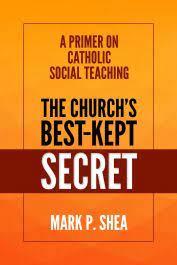
Mark Shea’s excellent primer on Catholic social teaching has the catchy but rather odd title The Church’s Best-Kept Secret. I don’t blame Mark in the least for the oddness. He’s right that many people, both Catholic and non-Catholic, don’t understand the shape of Catholic social teaching. In particular, conservative American Catholics of the past few decades, proudly declaring themselves “faithful to the Magisterium” and denouncing “Cafeteria Catholicism,” have bought into the notion that Catholic social teaching is fundamentally about a limited set of “non-negotiables” which happen to line up with conservative Republican politics. Hence, Hadley Arkes could claim in all seriousness last year that Biden does not agree with Catholic teaching on anything of “moral consequence.” On a Catholic Facebook group recently, when I pointed out that pro-choice Catholic politicians were not simply “not really Catholic” but were in fact inspired by Catholic teachings on social justice, one poster argued that social justice is not a genuinely Catholic concept at all.
Mark’s book offers an antidote to this disastrously common misunderstanding of the Church’s teaching. In less than 150 pages, he expounds the four key principles of Catholic social teaching: human dignity, the common good, subsidiarity, and solidarity. He grounds specific “hot-button” issues in core Catholic theological and moral principles, arguing from impeccably orthodox premises.
Human dignity
Mark’s journey from a fairly standard, though unusually thoughtful and nuanced, spokesman for the Catholic apologetics movement of the late 20th century to a maverick advocate of social justice shunned by many of his former admirers began when he took a stand against the use of torture during the Bush years. This gives his excellent discussion of the dignity of the human person a particular energy. He starts from the premise, which as he says was first clearly articulated at Vatican II though rooted in the principles of previous Catholic teaching, that human beings are “willed by God for their own sake.” That is to say, whenever we make human life a means to some supposedly greater end we sin against the dignity with which God has endowed all human persons. That is why advocates of torture or defenders of the use of weapons of mass destruction (at Hiroshima and Nagasaki, say) are violating Church teaching in exactly the same way as those who advocate abortion.
I myself would go further than Mark insofar as I’d say that actually many abortions are not fairly compared with torture and mass bombing, except perhaps with very extreme and difficult situations where these acts seem necessary to protect the innocent. For instance, many people debate these issues by citing a hypothetical situation where torture seems like the only way to stop a terrorist plot or where there is a grave reason to bomb a target that will result in the deaths of civilians. In such cases we are dealing with some form of “double effect.” (More so with bombing than with torture–the reason torture is such a clear-cut case is that the pain inflicted on the victim is itself the necessary means to the end rather than a side effect, while at the same time it is not legally justified as a punishment even if many people may believe or assume that the victim probably “deserves” it.) But in practice, governments often do these things in the service of a vaguely invoked national interest that may not have a direct connection with protecting specific innocent people from an evident threat. “Ticking time bomb” situations are relatively rare and largely hypothetical.
On the other hand, in many (perhaps most) abortions the death of the child is not itself the end being willed. Abortions where that’s not the case–aborting children with Downs’ Syndrome, say, or even because their birth will interfere with the parents’ economic prospects or career plans–are a fairer comparison. But in cases where the mother’s life or health is under threat, abortion is primarily about protecting the mother by ending a pregnancy that harms her. That doesn’t make it justifiable–for “double effect” to be a justification Catholic ethics requires a very strict set of criteria. But it’s a much more difficult moral question in those cases than simply devaluing one life in order to serve the interests of another.
Of course Mark is writing to–and from the perspective of–those for whom it’s a given that abortion is a particularly horrific form of murder. Throughout the book, Mark’s basically conservative assumptions are evident. That is not odd or remarkable–Mark is an orthodox Catholic who, if anything, leans to the more conservative side of the spectrum of Catholic opinion. But given the conservative slant of Catholic popular discourse in America in recent decades, Mark’s generally “center-right” position seems radically liberal to many people.
The Common Good, Solidarity, and Subsidiarity
Mark’s treatment of the other three principles is similarly solid and clear. He explains the deep Catholic roots of the concept of the “common good,” often criticized as “socialist” by American conservatives. As Mark points out, the principle of the common good is an “extension” of the principle of human dignity, not an opposing principle requiring balance. It isn’t about valuing the collective over the individual but rather about affirming the equal dignity of all persons. Just as the Persons of the Trinity exist in an eternal relationship of communion with each other in which there is no competition and no conflict, so we are called to live in relationship with one another as well as with the God who made us in the image of the Trinity. Mark shows how principles such as the universal destination of goods, the preferential option for the poor, and care for the earth as our common home all develop from this relational, Trinitarian understanding of what it means to be a human being made in God’s image.
Similarly, Mark explodes the idea that solidarity and subsidiarity are conflicting principles to be balanced. Subsidiarity is about being “the hands of God to others,” caring for needs at the most personal level possible. (Though Mark points out that coercion and punishment are important exceptions to this–in those cases we want to “kick them up the ladder as high as possible” rather than allowing people to mete out retribution personally.) It is another expression of the fundamental principle that people are made in God’s image. So is solidarity–the affirmation that “no man is an island” and we are all in this together.
Final thoughts
It’s hard to review a book with which one fundamentally agrees. It’s much easier, at least for a contrarian like me, to point out everything one doesn’t like about a book. There’s not much in that line to point out here. If anything, as I said earlier, Mark is more conservative than I am (which of course may be a damning admission about myself in some people’ eyes). Like C. S. Lewis, whom he quotes in this regard, he’s more interested in the individual than in social change per se. This isn’t a book deeply shaped by liberation theology or promoting any kind of radical or controversial theories not fairly clearly found in the Magisterial documents themselves.
Like all Mark’s writing, it’s crystal clear and brilliantly boils down complex ideas to relatively simple forms illustrated by vivid examples. Perhaps, from my jaded academic perspective, it makes things seem a bit too simple. But someone needs to do that, or we will all wander in a wilderness of nuance forever. And what’s remarkable about this book is how nuanced it manages to be given its size and its generally popular style.
The greatest strength of the book, though, is how deeply it’s rooted in the core convictions of orthodox Catholic faith. Mark’s love for Jesus and his commitment to historic Christian orthodoxy radiate throughout the book. Mark was a huge influence on my own decision, after years of dithering, to become Catholic, and this book illustrates why. If you only buy one book on Catholic social teaching, buy this one.












